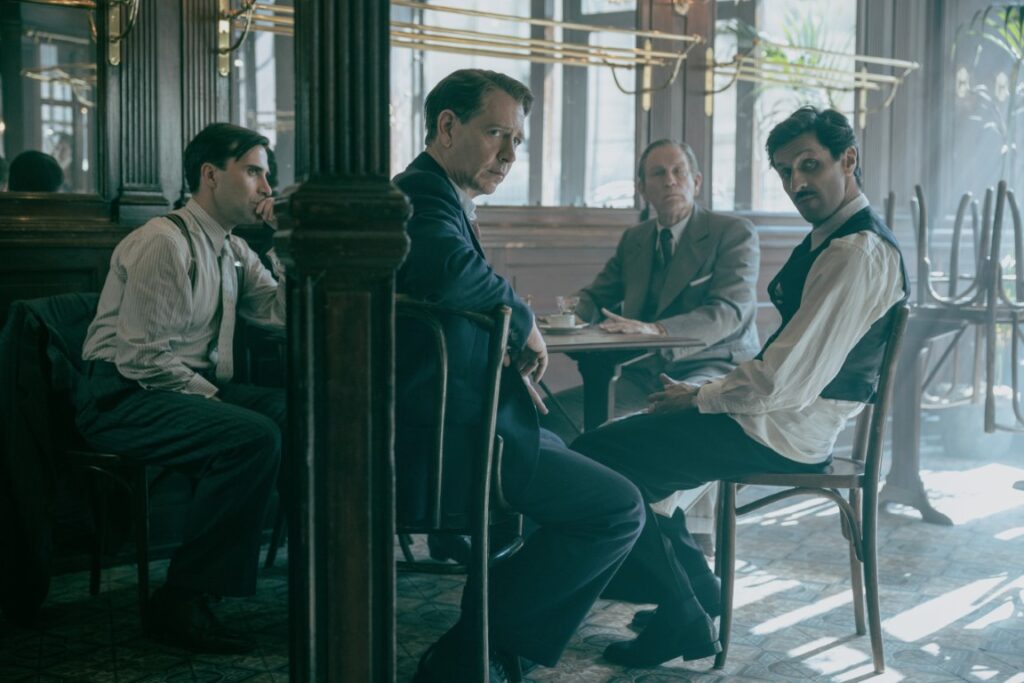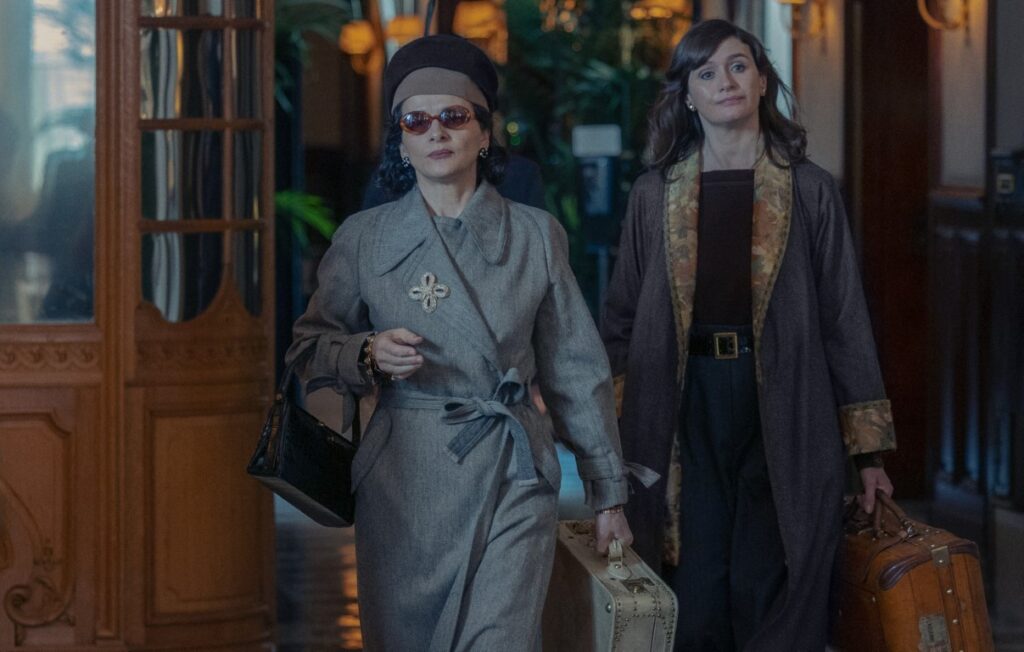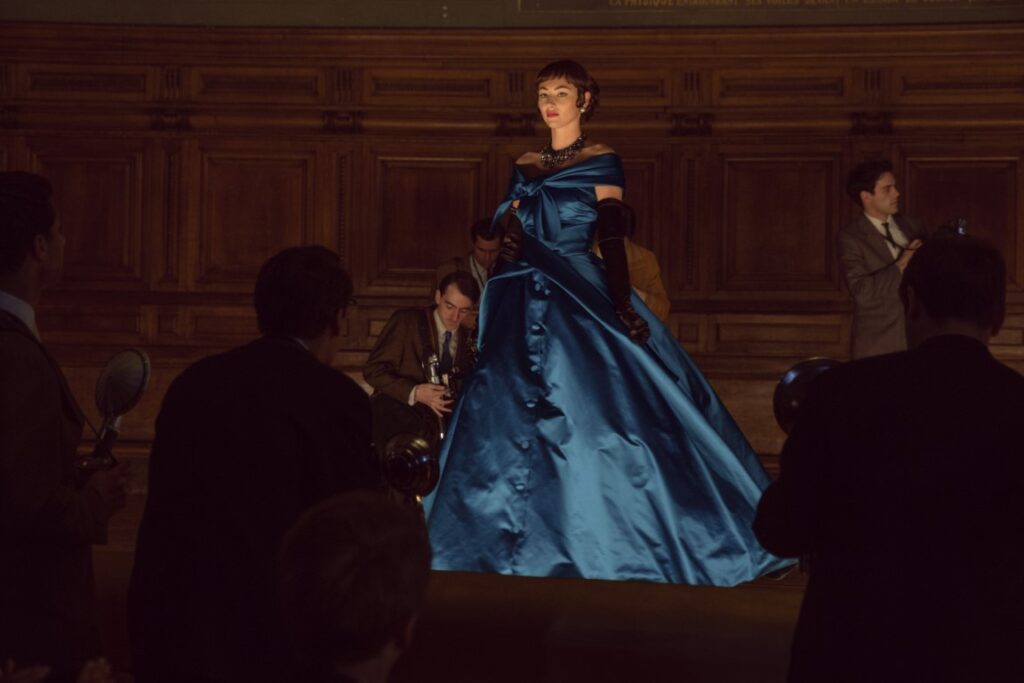Read also:
How to Watch FX Live Without CableHow To Watch AMC Without CableHow to Watch ABC Without CableHow to Watch Paramount Network Without CableApple TV+’s latest miniseries blends fashion with fascism in its dramatization of the couture wars of the 1940s and ’50s.
Across the crowded ballroom, Christian Dior (Ben Mendelsohn) spies Coco Chanel (Juliette Binoche) in the arms of a Nazi officer. War and occupation are chaos for everyone, yet these two legends of fashion couldn’t have chosen more different paths through the fog. Todd A. Kessler’s new series for AppleTV, The New Look, fashions history and gossip and tells the diverging stories of these designers with a simplicity that blossoms as the series completes its ten-episode parade.
The first three episodes, which make up the pilot drop, see us through the Nazi occupation of Paris and the end of World War II. The rest of the series will trace the fallout from the choices made during the war and return us to the 1950s, where our series begins with Dior, now the face of fashion, lecturing to students at The Sorbonne. After a dizzying display of fabulous designs, cementing that this series considers fashion a wearable art, Monsieur Dior opens the floor for questions. Immediately, he is confronted with accusations that he kept designing for Nazi girlfriends while others like Coco Chanel closed their shop. But, as Dior says with a sigh, there is a “truth behind the truth.”
By 1943, three years into the occupation of Paris, the world was anything but black and white. Yes, some of his dresses are ordered for the mistresses of Nazi officials, but as a tailor toiling under the crude taskmaster, Lucien Lelong (John Malkovich), he has very little say over how his work is used. At the start of the series, Dior is a nobody with very little sense of how significant an impact he will have on world fashion. But he gets by with the help of his comrades Cristóbal Balenciaga (Nuno Lopes) and Pierre Balmain (Thomas Poitevin), who support and challenge one another, each hungry to make their mark on Paris and the world.

Meanwhile, his sister, Catherine Dior (Maisie Williams), has answered the call for direct action as a member of The French Resistance. Though her bravery is perilous, her courage and example keep Christian on the right side of history. At times, Christian wishes he could be as bold as she is, but his queerness makes him highly vulnerable, even if his romance with Jacques (David Kammenos) is more or less an open secret.
Secrets are a currency. Sometimes, they can be used as credit, but often, they come with debts, as Coco Chanel quickly finds out. She’s already been to the Nazis for a favor before the series begins. Now locked out of funds, she opens the channels again to see if they might help her with her Jewish business partners. Soon her business proposition whisks her into the Nazi inner circle, dining with Himmler and his unappetizing logic of extermination while being coerced into being a go-between. Through her vain attempt at control, Coco throws herself into a dangerous quid pro quo that will have vast implications for her and her brand.
Binoche’s Chanel is an extraordinary work of character design. She is a different Chanel than we usually see, one with all her flaws and liabilities exposed. This Coco is far from chic. Binoche plays her like a rat, scurrying and gnawing in corners, screaming whenever she feels threatened. Most terrifying is the humanity with which Binoche embodies her character. Binoche lives in her character as both a legend and a woman living during extraordinary times. You can see her character strategizing, calculating each potential cost, and desperately trying to back out when she’s in over her head.
While certainly not sympathetic, her actions are “understandable,” part of a logical momentum that is partially of and outside of Coco’s control. Despite all her wealth and prestige, this world is slipping through her fingers. She can easily become distraught, and the only one who can truly ground her character is her best friend, Elsa Lombardi, played by the enchanting Emily Mortimer.

Elsa and Coco’s relationship would be a delight if it weren’t all in service of fascism. Mortimer’s character comes with her own debts to fascism, and together, the pair use each other to keep themselves afloat. But Binoche and Mortimer are a dream pair to watch, chummy brunettes laughing in their slacks as if they owned the world. But even in all her airy and comedic delivery, Mortimer still gets real moments of gravity, and she needs to lean on Coco.
We do not go through this world alone, and every character in The New Look balances a friend or family member by working as a counterweight. Coco has Elsa; Christian has Catherine. Williams has perhaps the most challenging arc in the series, and she carries it with resilience and fortitude, which transforms Catherine into the supporting character, the one others turn to for strength and determination to carry on, especially her brother Christian.
Mendelsohn comports himself into Dior, the mild-mannered tradesman who has yet to find his voice. It trembles, barely rising above a mumble, particularly in the presence of John Malkovich, who pronounces his lines as if he were a jazz clarinet. Despite all we know of what will come later, the Dior in this series is the underdog. Mendelsohn plays him with a captivating humility that fully earns our trust and empathy. Mendelsohn has finely tailored his personification to his character arc. He grows more resolute as the series progresses, and Christian finds his direction.

Thanks to the reciprocal kindnesses of his friends and clients, he stands a little taller in his shoes, willing to ask for things and take risks. But in the beginning, Dior is far less likely to take risks during the occupation, despite Catherine’s urging. He is the breadwinner of his family. Working for Lelong provides a steady income, even if his clients are undesirable for now.
The New Look is relevant to us now for all the ways it depicts like under fascism and the options people face during occupation. It may be a simplified “papers please” depiction of fascism that predominantly manifests as an infringement on individual liberty and free movement, but Todd A. Kessler makes clear distinctions between those who worked for the Nazis as a calculated risk during “the chaos of war” to live and those who collaborated with them for mutual benefit.
There’s an insidious way the word “opportunity” snakes its way through the series. Coco may not be a part of the Nazi Party, but she shares the same business objectives of seizure and control. The series is a well-dressed look at liberal silence and complicity when confronting fascism and how easily the two can fall into each other’s arms.
When Dior glimpses Coco schmoozing with the Germans across the room, he’s there on different business. For all of Coco’s duplicity, the Diors are examples of the other paths we can take when fascism has us in its chokehold. We make underground networks of mutual aid. Life becomes about the little kindnesses we can share. “This is the story of how creation helped return spirit and life to the world,” Kessler writes in the opening prologue. Though it singles out Dior as the cultivator of that creation, The New Look is a testament to the atelier of friends and colleagues that help make life bloom and worth celebrating as a work of living art.
All ten episodes were made available before review.
The New Look premieres on Apple TV+ February 14th.